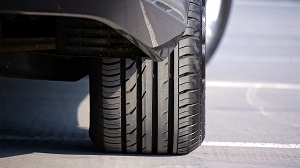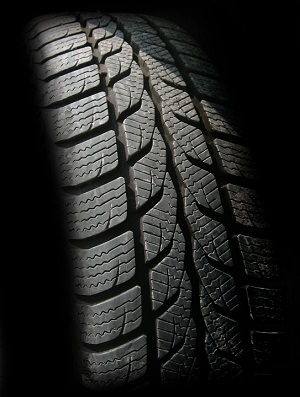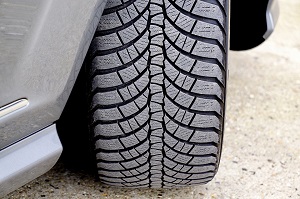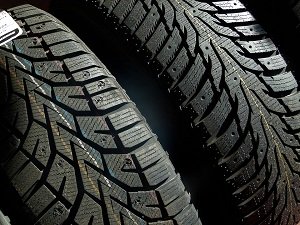Posted on 6/25/2020

Bubbles in your tires are generally caused by impacts on the road. Hitting the edges of potholes, small collisions, hitting a curb and speed bumps can all cause the sidewall to bulge in your tires. Your tires should always be smooth and round, so if you notice a bubble on the sidewall or see a section of tread bulging, it’s a sign that something is very wrong, and you should stop driving immediately. Tires that have a bubble are not safe to drive. When your tire has a bubble, the fabric of the inner tire can no longer protect your tire from bursting when pressure develops from contact with the road. The most common place to see a bubble in the tire is the sidewall. Tire bubbles can also form in areas where the rubber has worn very thin. Driving on a tire that has a bubble is very dangerous and there is a high possibility that it will blow out on you. Your top priority should be getting the tire replaced as soon as possible because as more moisture and air seeps in, the bubbles will ge ... read more
Posted on 5/15/2020

A crucial factor in your vehicle’s health, efficiency and performance is getting regular tire rotations. A tire rotation is when the tires of your vehicle are moved from one position on the vehicle to another. The front tires will move to the rear and the rear tires will move to the front, typically in a cross-diagonal direction, meaning they will also change sides. Your vehicle carries more weight at the front, so front tires will typically wear out faster. Tire rotation is done to prevent the uneven wear this can cause and to prolong the life of your tires. Your tires should be rotated at the same interval you get an oil change. The guidelines in your vehicle’s owner manual offer timing as well as the best rotation pattern for your vehicle and type of tires. The tires are the only part of the car which make direct contact with the road and influence your vehicle handling, ride, braking and safety. For optimum performance, tires must have the correct air pressure, tread depth, balan ... read more
Posted on 5/5/2020

Keeping your tires properly inflated is a key to getting the maximum fuel efficiency from your vehicle. Properly inflated tires also reduce tread wear, improve your car’s stopping distance, and decrease the chances of a blowout. Nitrogen-filled tires are said to have the benefit of keeping your tires inflated longer than the standard compressed air tires. The air in your tires eventually escape through the tire’s inner liner, but nitrogen-filled tires take a longer time. Routine maintenance is critical to long tire life, and proper tire pressure will ensure the good health of your tires. The greatest benefit that nitrogen-filled tires are said to provide is keeping your vehicle’s tires inflated longer, which saves you money at the pump. Even so, researchers have concluded that although nitrogen will slow down tire inflation loss, you’ll still need to check and top off your air roughly every other month to stay within the ideal inflation range. Nitrogen-filled Tires FAQ Q: Will I get b ... read more
Posted on 3/12/2020

Tire storage is an important factor in maximizing the life of your tires. While swapping out one set of tires for another is a challenge in itself, once your winter tires are removed, you still need to store them properly for the warm months ahead. It’s important that your tires be properly stored when they’re not in use in order to make sure they’re ready to go when the temperature drops. Storing your winter tires is beneficial because: Improper storage can result in reduced life for your tires or end up making them unusable. If your tires are not stored properly heat, UV light, or direct sunlight can break down the rubber and cause them to become damaged. Tires become unstable and deformed and you won’t be able to use them. Proper storage prolongs the life of your tires. Outgassing — aged rubber loses volatile oils which makes tires crack or “dry-rot.” Tire Storage Q&As Can tires be stored outside? Tires are best kept in a climate-controlled environment. Tire ... read more
Posted on 2/14/2020

Good tires are not cheap, so it is important that you do everything you can to extend the life of your tires. Because a vehicle’s tires are the first point of contact, road hazards such as small rocks, trash, debris, and salt and chemicals can be hazardous while driving. Attempting to avoid the debris is dangerous when driving because — both visually and mentally — it is hard to process the hazard level of an object in the few seconds a driver has to react. Drivers who encounter road debris, often don't have the time or space to avoid a collision, and these accidents can be quite serious. Encountering several unfriendly obstacles on the road such as potholes, steel plates, uneven seams, branches, roadkill, gravel, glass, and more are common. Even if this debris does not puncture your tire, it can cause your tires to wear down unevenly. If you notice road debris, or if you have to drive over rocky paths or gravel, drive slowly and carefully. Avoid these obstacles as much as you can. Tr ... read more